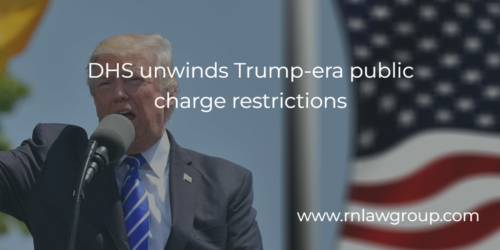
DHS unwinds Trump-era public charge restrictions
On Thursday, September 08, 2022, the Biden Administration finalized a rule replacing the Trump-era regulation regarding the “public charge rule”, meant to limit immigration of individuals who had previously used government support. Under longstanding immigration policy, federal officials can deny entry to the U.S. or adjustment to legal permanent resident (LPR) status (i.e., a “green card”) to someone they determine to be a public charge. The Trump-era regulation blocked individuals who had received financial assistance from any one program for a year and allowed the Department of Homeland Security (DHS) to consider the individual’s participation in non-cash support like food stamp programs, housing vouchers, or Medicaid.
The new rule by the Biden Administration requires DHS to make any determinations on the potential to become a public charge based on the possibility that the individual is likely at any time to become primarily dependent for subsistence. Under the final rule, the Department of Homeland Security will return to the 1999 public charge standard which considers benefits, like cash assistance for income maintenance under TANF and long-term institutionalization at government expense. Immigration officials can consider an applicant’s financial resources, health, education, skills, family status, and age. But few people are rejected on these relatively narrow grounds, experts said.
The previous Trump-era public charge rule cause massive confusion among immigrants and led to some avoiding receiving benefits they were eligible for out of fear that they would no longer be eligible for immigration benefits and permanent legal residence. The Biden Administrations decision to revert back to the 1999 public charge standard allays those fears.
Karim Jivani is a Special Attention Staff Attorney at Reddy Neumann Brown PC who focuses on employment-based non-immigrant visas. Karim’s practice covers all phases of the visa process including filing petitions, responding to Requests for Evidence (RFE), and drafting motions and appeals. He has completed over 30 RFE’s to date in response to H-1B, L-1, I-140, and VAWA petitions.
Reddy & Neumann has been serving the business community for over 20 years and is Houston’s largest immigration law firm focused solely on US. Employment-based immigration. We work with both employers and their employees, helping them navigate the immigration process quickly and cost-effectively

